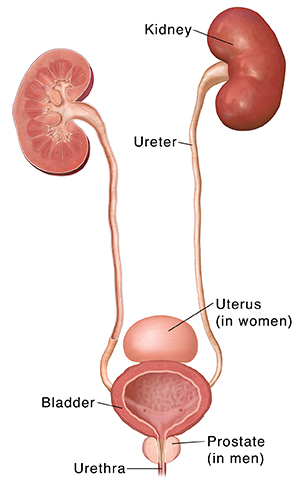What Is Kidney (Renal) Cancer?
What Is Kidney (Renal) Cancer?

Understanding the kidneys
The kidneys are bean-shaped organs about the size of a bar of soap. They are found in the low back area, one on each side of the spine. The kidneys help keep the body alive by filtering waste and excess fluid from the blood. The kidneys send this liquid and waste (urine) to the bladder through the ureters. Urine then leaves the body through the urethra.
When kidney cancer forms
Kidney cancer forms when cells in the kidney change and multiply abnormally. The cancer can interfere with the working of the kidneys. Kidney cancer may spread beyond the kidneys to other parts of the body. This spread is called metastasis. The more cancer spreads, the harder it is to treat.
Treatment choices for kidney cancer
You and your healthcare provider will discuss a treatment plan that's best for your needs. Treatment choices may include the following.
Surgery
Surgery is the most common treatment for kidney cancer. Your healthcare provider may advise surgery to treat your kidney cancer if any of these apply to you:
You are healthy enough to have surgery. Your healthcare provider will only advise surgery if he or she expects you to be able to recover from it.
The tumor is small. In this case, your healthcare provider may do a partial nephrectomy. This surgery allows you to keep some kidney function. Only the part of the kidney that contains the tumor is taken out. In some cases, your provider may advise this surgery if the tumor is larger but you have cancer in both kidneys or if you have only one kidney. The benefit is that you keep part of the kidney. The risk is that there is a chance some cancer cells will be left behind.
The tumor is larger, but is only in your kidney. Your healthcare provider will advise the type of surgery you need based on the size of the tumor and where it is. Your provider may advise a simple nephrectomy. This is surgery to take out the entire kidney. Or your provider may advise a radical nephrectomy. This is surgery to take out the whole kidney and the adrenal gland. The adrenal gland is attached to the top of the kidney. Much of the nearby fatty tissue is also taken out. Nearby lymph nodes will also likely be removed. That's because cancer may travel to the nodes first. Taking out the lymph nodes may help prevent the spread of cancer to other parts of your body. And looking at these lymph nodes helps your provider figure out the stage of the cancer. This is important in deciding whether you need other treatments after surgery.
You have kidney cancer that has spread to other areas and your doctors believe that removing the original kidney tumor will be a useful and effective addition to treatment. Your healthcare provider may suggest a radical nephrectomy and removal of nearby lymph nodes. The tumor or tumors in other parts of the body may also be removed or it may be recommended that you get anti-cancer drug therapy. Even in cases where surgery won’t cure the cancer, surgery can sometimes help ease symptoms such as pressure, pain, or bleeding.
You have symptoms. You may have pain, pressure, or bleeding from tumors that have spread. Your healthcare provider may suggest surgery to remove the tumors. This is done to ease symptoms. Because it doesn't cure the cancer, it is called palliative therapy.
Biologic therapy (immunotherapy)
This treatment strengthens your immune system to help fight cancer. It uses medicines that work like the chemicals that your body’s immune system makes. They help your immune system fight the cancer.
Chemotherapy
Chemotherapy uses medicines to kill cancer cells. Regular chemotherapy medicines don't usually work well against kidney cancer. Chemotherapy has mostly been replaced by biologic therapy in kidney cancer treatment. But chemotherapy medicines are still sometimes used in rare cases where biologic therapy has not worked.
Radiation therapy
Radiation therapy uses directed rays of energy to kill cancer cells. Radiation therapy doesn't work as well as other methods for treating kidney cancer. Still, it may be used to treat someone who's not healthy enough to have surgery, or a person with kidney cancer that's not responding to other treatments. It may also be used to treat kidney cancer that has spread to the brain or bones. It may be used to treat pain caused by cancer that has spread to the bone (bone metastasis). It can also help stabilize a bone that has been weakened by metastasis and may be at risk for breaking.
Targeted therapies
These therapies use medicines to focus on or prevent changes in the cancer cells. The changes may be either in the cell's molecules or genes. These medicines help keep the cells from growing out of control and spreading to other parts of the body.
Updated:
May 13, 2017
Reviewed By:
Image reviewed by StayWell medical illustration team.,LoCicero, Richard, MD,Stump-Sutliff, Kim, RN, MSN, AOCNS